Arlingtonians could have an update on the results of the Arlington County Board Democratic primary as soon as this afternoon, according to the local elections office.
“We will be accepting about 500 mail and provisional ballots today and results will be uploaded throughout the afternoon,” says spokeswoman Tania Griffin. “We’ll also have an update regarding the [ranked-choice voting] tabulation later this afternoon as well.”
For the first time, Arlington voters used a ranked-choice system to pick their top candidates for the County Board, which has two open seats this year. The outcome will come down to who voters ranked second and third place.
It is a squeaker so far for Susan Cunningham, Natalie Roy, Maureen Coffey and Julius “J.D.” Spain, whose tally of first-choice votes are within a range of only 5 percentage points from most to least.
“This race is still wide open,” said Liz White, the executive director of UpVote Virginia, which has been educating residents about ranked-choice voting ahead of the primary.
“Four out of the six candidates could very well secure a win once subsequent rounds are tabulated,” she said in an email. “Round-by-round tabulation will occur as soon as all provisional and mail ballots are processed. Once all votes are processed, the tabulation is instantaneous.”
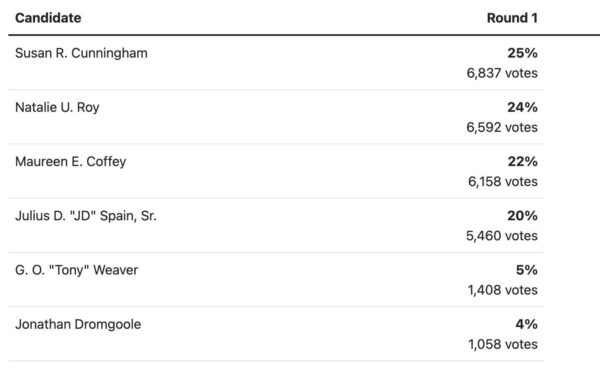
No candidate crossed the threshold for early victory: 33.3% of the first-choice votes, plus one vote. The next step will be eliminating the lowest vote getters, in order. Who people picked after first ranking Jonathan Dromgoole and Tony Weaver could get any of the four other candidates past the finish line.
Cunningham, who took the lead in the first round of votes, tells ARLnow she has made peace with whatever happens next. Coffey, who currently sits in third place, says she is “on pins and needles” waiting for the results.
Political consultant Ben Tribbett is placing his bets that those who ranked Dromgoole first likely ranked Coffey or Spain next.
“When you get to the actual ranking of candidates, I think the third and fourth-place candidates are going to go on to win the election,” Tribbett said. “I would expect in that first round, that Maureen is going to win. There’s a chance Susan Cunningham could hold off J.D. in the second round.”
On Tuesday, County Board member Takis Karantonis — who endorsed Coffey and Spain — said Coffey performed well on a per campaign dollar spent basis. Meanwhile Spain, who had racked up several endorsements and raised substantial funds, underperformed, which he called a “sobering result.”
Looking precinct by precinct, it is clear that each of the candidates had a base. The more urban places with younger voters went for Coffey, while single-family home enclaves went for Cunningham and Roy, who were most critical of the zoning changes known as Missing Middle.
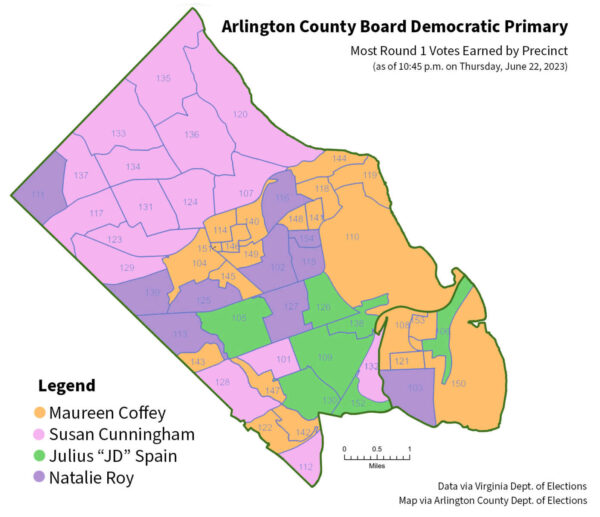
Spain told ARLnow on Tuesday night that he enjoyed strong support in his neighborhood, Penrose, while noting more confrontations with upset voters above Langston Blvd.
“We won the most diverse precincts in Arlington,” he said. “[I’m] proud of that.”
Tribbett was more blunt about what he saw as the electoral dynamic, citing the geographic distribution of votes in the Commonwealth’s Attorney race in particular.
“It’s the Karens versus the non-Karens,” he said. “Clearly, there’s a divide in the community that jumps out at you.”
While the results of the ranked-choice Arlington County Board election have yet to be determined, the voting method has a champion in Rep. Don Beyer.
Beyer tells ARLnow that voters are more likely to see someone they support reach the Board as a result of the voting method’s choice in the six-way Democratic primary for two open seats. He had another reason for supporting ranked-choice voting, too: it rewards candidates who build diverse coalitions, meaning candidates away from the partisan extremes are more likely to emerge triumphant.
“I’m a very strong supporter of ranked-choice voting as it maximizes the happiness and satisfaction of citizens,” said Beyer, who has represented Virginia’s 8th congressional district since 2015, during an interview yesterday (Wednesday) at his office on Capitol Hill.
For the first time, local voters went to the polls on Tuesday — and in early voting — and ranked their candidates in order of preference. Their votes count towards another candidate if their top pick is eliminated in what is known as “single transferable vote.”
Since the Virginia General Assembly gave Arlington permission to try it out before the rest of the state, election officials say lots of people are watching this race with interest. That includes Beyer, who observed that so far, the voting process seemed to be working.
“The early feedback this morning was that there were almost no bad ballots, meaning that almost everyone understood the ranked-choice voting method. It is not that hard, all you have to do is go through your choice one through three in terms of preference,” Beyer said.
There have been reports of confusion leading up to the primary, particularly about how votes are counted. An informal ARLnow poll found that some 20% of primary voters were confused either by the voting or tabulation process but most found it straightforward.
For Beyer, however, the benefits are clear.
“With ranked-choice voting, people are able to rank their top three choices, knowing that one of those three people is likely to win. As a voter, you have the chance to see someone who you most prefer to be elected. Without this, if your first choice does not win, you have no say beyond that one person,” Beyer said.
The congressman said at the national level, ranked-choice voting could have a moderating effect on the two political parties, which are pulling voters farther right or left as more extreme candidates emerge.
“In the Democratic primary, candidates appeal to the Democratic base which means they’re going to pull it farther and farther to the left. Republicans are going to pull farther and farther to the right,” Beyer said. “In Congress, there is no overlap. There is the missing moderate. We are so polarized, however, ranked choice voting allows for candidates who will serve everyone rather than one side to be elected.”
While ranked-choice voting could theoretically help results get calculated more quickly, jurisdictions voting this way, including Arlington, appear to instead be waiting longer to ensure all the ballots are in. That means results are not clear immediately after election night, though this expectation has also been eroded in conventional election by more people using mail-in and provisional ballots.
For Beyer, waiting is a secondary concern to what he says could be a healthier democracy.
“I’m excited about ranked-choice voting and believe that it will be good for our democracy which is the key thing,” he said. “It will also benefit our parties and make our voting system more responsive. I am always advocating for it.”
Today, the Arlington County Dept. of Elections said its staff began uploading votes. Calculating who is eliminated in the tabulation rounds and redistributing second-choice votes, however, may not begin until the weekend.
Meantime, Arlington County is asking voters for feedback on their ranked-choice experience.

Our latest morning poll is, admittedly, a bit niche.
Only 16% or so of Arlington registered voters cast a ballot in yesterday’s Democratic primary. Beyond the closely watched Commonwealth’s Attorney race, the primary was notable for being the first locally to utilize ranked choice voting, for the six-way County Board race.
Depending on which news article you were reading yesterday, voters were either flummoxed by the concept of RCV or thought it no big deal to fill in bubbles for their first, second and third choices of candidate.
“Virginia’s first ranked-choice election is vexing some Arlington voters,” said a Washington Post headline. The article went on to report that “Advocates for ranked-choice voting have cheered this pilot initiative, saying it will lead to results that better reflect the will of the electorate. But there seems to be one hiccup so far: Not many people understand how it works.”
WTOP talked to a voter who had trouble casting a valid ballot, but was able to fix it.
“Some found the ranked-choice voting system to be simple, while others encountered issues initially,” the radio station reported. “‘I did find it confusing, and in fact, on my first try, my ballot was rejected,’ Carol Davidson told WTOP, adding that she was eventually able to cast her vote.”
On the other hand, Virginia Mercury, a statewide outlet that’s part of a left-of-center nonprofit, said RCV voting in Arlington was “mostly smooth.”
“Many Arlington Democratic voters spoke positively about the ranked-choice voting system being pioneered this Primary Day for two county board of supervisors seats, although some said more education would have been helpful,” the outlet reported. “‘It was pretty easy,’ said Andrea Hansen, a resident who cast a ballot at the Westover precinct. ‘I think it gives the impression of more of an equal playing field and it encourages people to read up more on the candidates.'”
Either way, Arlington County is now asking for feedback on RCV, seeking voters who want to “share their opinions on and experiences with RCV in Arlington.”
We also want to know how ranked choice went, if you cast a ballot in the Democratic primary. Did it all make sense or did something about it confuse you?
All the while, Arlington awaits the results of the County Board voting: final tabulation to determine the Democratic nominees for the two open seats can take place no earlier than Friday, when the last of the legal mail-in ballots arrive.
(Updated at 9:25 p.m.) Commonwealth’s Attorney incumbent Parisa Dehghani-Tafti has defeated challenger Josh Katcher in Tuesday’s Democratic primary.
Dehghani-Tafti has 56% of the vote to 44% for Katcher, her former deputy, in the heated race for the top prosecutor of Arlington and Falls Church. That’s as of 8:40 p.m., with all but a few hundred provisional and late-arriving mailed ballots counted in Arlington. Polls closed at 7 p.m.
Katcher, standing outside of his watch party at Lost Dog Cafe in Westover, called Dehghani-Tafti shortly before 8:50 p.m. to concede the race.
The contentious — and expensive — contest has been seen as something of a referendum on the incumbent’s brand of vocal justice reform advocacy. Katcher, while billing himself as also in favor of justice reform, put a spotlight on Dehghani-Tafti’s leadership, which he linked to departures of deputy prosecutors amid a reported rise in crime.
“Right now we’re going to celebrate what we were able to accomplish with this campaign and thank the volunteers,” Katcher told ARLnow before heading back into his event.
“Over the course of the last six months, we’ve had an important debate in our community over the future of criminal justice reform,” he said in a subsequent written statement. “Our team left it all on the field, as we sought to have a debate about what real reform and real justice could mean for our community… I stand ready to continue my commitment to this community, to its safety and to the goal of ensuring that we are balancing the need for both justice and compassion.”
Dehghani-Tafti also thanked her supporters. Gesturing to the crowd gathered at her event at Fire Works Pizza in Courthouse (held with County Board candidate JD Spain) she said those present reflect a tiny fraction of the people who donated, volunteered, “held my hand,” and knocked on doors.
“A campaign based on love, dignity and respect prevailed,” she said. “I’m grateful for the trust everybody has placed in me.”
In the other two closely watched local races, for County Board and Sheriff, leads were slim.
The three-way county sheriff race has Jose Quiroz with a widening lead compared to earlier in the night, with 40% to 34% for former deputy sheriff Wanda Younger and 27% for Arlington police corporal James Herring.
Quiroz was appointed Acting Sheriff after the departure of long-time Sheriff Beth Arthur earlier this year. The position is primarily responsible for running the county jail in Courthouse, with the Sheriff’s Office also handling court security, civil process serving, and some law and traffic enforcement responsibilities.
The Arlington County Board primary, meanwhile, is being conducted for the first time using ranked choice voting, which means final tabulation will not take place until Friday at the earliest. Results of “first choice” votes are being posted, however, showing Susan Cunningham with 25%, Natalie Roy with 24%, Maureen Coffey with 22%, and JD Spain with 20%.
Just under 10% of voters have cast ballots in today’s Democratic primary as of 9 a.m.
That includes 7% who voted early or by mail and 2% voting at the polls Tuesday morning, according to Arlington County election officials.
Today’s primary, for the first time in Arlington, features the use of ranked choice voting, for the six-way race for the two open Arlington County Board seats. Voters are asked to fill in the bubble for up to three candidates, in order of priority — one each for first, second and third choice.
The County Board race has seen a wide range of endorsements and one particularly divisive issue dividing candidate factions: the recently-passed Missing Middle housing ordinance allowing smaller-scale multifamily homes in neighborhoods previously zoned only for single-family detached houses.
The other closely watched race today is that for Arlington and Falls Church’s top prosecutor, between incumbent Parisa Dehghani-Tafti and her former deputy, Josh Katcher.
The incumbent Commonwealth’s Attorney has continued to campaign — and raise significant campaign funding — on her national profile as a justice reformer. Katcher says he supports a more practical and effective implementation of justice reform, and has picked up an endorsement from the local police union amid a rise in crime, according to recent police statistics.
The race has also seen Katcher face some criticism for taking campaign contributions from Republicans.
Additional races include a three-way race for county Sheriff, a two-way race for State Senate (40th District), and a race for House of Delegates (2nd District) featuring one active candidate, Adele McClure, and Kevin Saucedo-Broach, who withdrew but remains on ballots.
Though turnout today is light compared to years in which federal races are on the primary ballot, it is in line with the last four-year cycle, in 2019, when Dehghani-Tafti defeated incumbent Theo Stamos for Commonwealth’s Attorney. Total voter turnout in that race was just under 17%.
Polls opened today at 6 a.m. and will close at 7 p.m.
While the results of most races should be known within a few hours, the final tally for County Board will take a few days — potentially extending into the weekend — due to how ranked choice votes are tabulated, including the need to wait until all legal mailed-in ballots are received
9am turnout estimates show ~2% of Arlington has voted today. This does not include the 7% who voted early or by mail. #ArlingtonVotes #RCVinArlington #Election2023
— Arlington Elections (@ArlingtonVotes) June 20, 2023
ARLnow previously asked candidates to write essays describing why Arlington voters should support them. Links to those posts are below.
Commonwealth’s Attorney: Josh Katcher and Parisa Dehghani-Tafti. County Board: Tony Weaver, Jonathan Dromgoole, JD Spain, Maureen Coffey, Susan Cunningham, and Natalie Roy. Sheriff: Jose Quiroz, James Herring, and Wanda Younger. State Senate: Barbara Favola.
Update at 1:50 p.m. — Primary day turnout is up to about 5%, bringing total turnout to 12%, according to the county elections office.
1:30pm turnout estimates show ~5% of Arlington has voted so far today. Bringing the total up to ~12%. #ArlingtonVotes #RCVinArlington #votevotevote
— Arlington Elections (@ArlingtonVotes) June 20, 2023
It's Election Day! Polls for the Democratic Primary Election are open from 6am-7pm. Verify your polling place location here: https://t.co/hDjQbBXALQ#ArlingtonVotes #Election2023 #RCVinArlington pic.twitter.com/7CXxq7OxKq
— Arlington Elections (@ArlingtonVotes) June 20, 2023
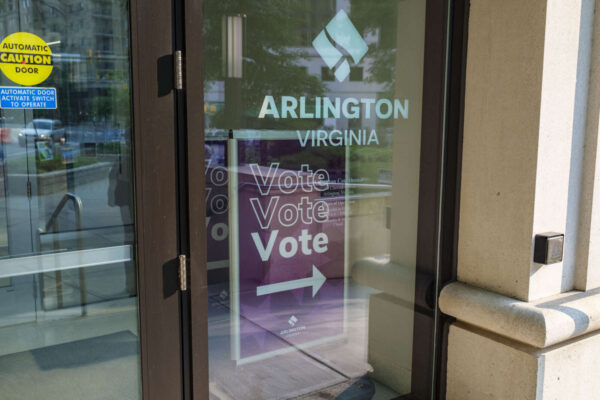
Just a few days remain to vote in the Arlington County Democratic primary.
Voters can cast their ballots early and in-person today (Friday) and tomorrow — or they can hit the polls on Tuesday.
This year, for the first time, residents are using ranked-choice voting to determine which Arlington County Board candidates will run with a (D) next to their names in the November general election. The format for every other primary contest is unchanged.
This article explains how to vote, how your vote is counted and why full results may come next weekend. At the minimum, this is what you should know:
- Anyone registered to vote, regardless of party, can participate in the primary.
- You can rank up to three of the six County Board candidates. You can only rank one or two if you want.
- Only two candidates will get the nomination.
- Only mark one oval per column and ask for assistance if you need help.
Filling out your ballot
Need a visual? This Arlington County flier provides step-by-step instructions:
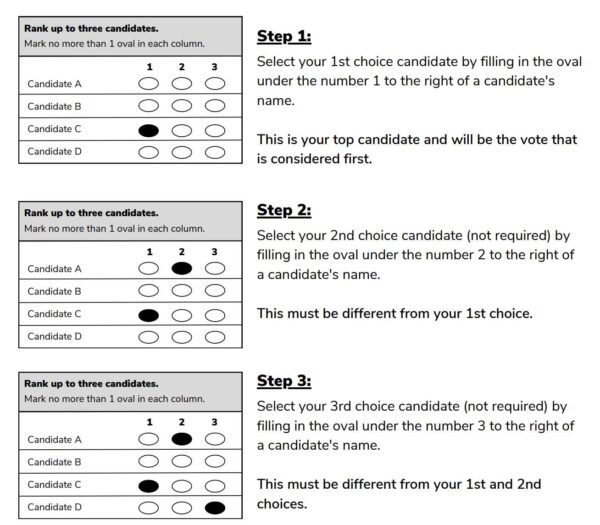
The scanner will reject ballots that look as follows.

“Voters have the option to mark a new ballot or cast their ballot with the errors,” Arlington Dept. of Elections Director Gretchen Reinemeyer says. “A vast majority choose to spoil their original ballot and mark a new ballot.”
If you mailed in a ballot with errors, it will be reviewed.
“Their ballots are scanned after they are separated from the voter’s name to preserve voter privacy,” Reinemeyer says. “These ballots are held until election day and will be adjudicated by teams of election officers to determine voter intent.”
The rate of spoiled ballots so far this primary season is a little higher than normal, but still small, she noted. Final stats on spoiled ballots will be published after the election.
How are the winners picked?
Liz White, the executive director of UpVote Virginia, tells ARLnow she used this analogy to explain tabulation when her organization educated Arlingtonians on ranked-choice voting.
You have $1 to spend to elect someone. Everyone pays their first pick $1 and whoever gets the least amount of money is eliminated.
A candidate who wins by a large margin does not need the full $1 — just, for instance, 70 cents. Your second pick gets 30 cents.
If your first-place candidate is eliminated, your second-place pick gets your full $1. Everyone has a whole vote: for some, it is split among two and for others, it supports the second-place pick.
Armed with this knowledge, White says do not get too strategic.
“One of the nice things is that voters don’t have to be pundits,” she said. “They can truly say, ‘If I don’t have this one candidate, I want to have this one.'”
Six months ago, the Arlington County Board adopted ranked-choice voting for the upcoming Democratic primary.
Since then, the Arlington elections office has been busy educating anyone who asks on the method, which only applies to candidates for County Board.
The Arlington branch of the NAACP, however, says the county needs to step up its outreach to ensure all voters are prepared when they cast early ballots or go to the polls on June 20.
ARLnow, for instance, has heard from some residents who are unsure or skeptical of how votes will be counted.
“We have directly heard a series of grave concerns from our community regarding the implementation of this significant change,” NAACP President Mike Hemminger said in a statement. “We will be monitoring this change with intense focus in the run up to and after the election to ensure that no one’s foundational right to vote becomes disenfranchised or impeded in Arlington County.”
Concern about outreach highlights the stakes of this trial run. Arlington is the first Virginia jurisdiction to test ranked-choice voting for the primary and one election official tells ARLnow that people outside the county are watching closely.
“It’s fair to say, without sounding dramatic, that the eyes of the Commonwealth are on Arlington and this ranked-choice voting process,” Arlington Electoral Board Secretary Scott McGeary says.
Its success in the primary could also determine if ranked-choice voting is adopted to pick the successors for Christian Dorsey and Katie Cristol in the November general election.
So far, interest in learning more about ranked-choice voting is strong, says Arlington Dept. of Voter Registration and Elections Director Gretchen Reinemeyer.
Her staff is working through an education plan it rolled out in April. Part of that is making presentations — at a clip of at least two presentations a week, and once three in one night — and helping community groups facilitate workshops.
“Rollout for ranked-choice voting has gone smoothly,” Reinemeyer says. “I would say that most voters understand the concept and are aware that the County Board race is using the voting method. A handful of voters are vocally unhappy. The most common question is ‘Do I have to rank all three?'”
The answer to that, McGeary says, is no. People can rank up to three candidates — the maximum county ballot machines can accommodate. Some recent endorsements have recommended how candidates should be ranked.
One key strategy was developing toolkits so that people and organizations could host information sessions and run mock elections, which Reinemeyer said has been an effective way to reach lots of people and explain how votes are counted.
“The idea of these toolkits is that anyone can take the toolkit and teach their friends, neighbors, community organizations about ranked choice voting,” Reinemeyer said. “We are seeing members of our community run with these toolkits.”
The county is also relying on materials the state produced. This includes two videos — one explaining how ranked-choice voting works and the other how votes are counted — as well as an FAQ page and flyers in Korean, Spanish and Vietnamese.
One notable change, per a state video, is that if there are no clear winners, it could take up to seven days to apportion second- and third-choice votes to determine who actually won.
“I have no doubt we’ll be able to do the math properly and get the results as fast as possible,” McGeary said. “From a technical and counting standpoint, I’m confident we’ll be able to count and announce as soon as possible.”
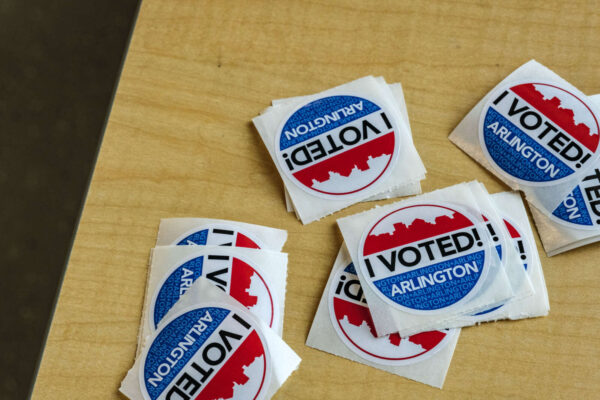
In the primary election next June, registered voters will be able to rank their preferred candidates for a seat on the Arlington County Board.
The change comes after the Arlington County Board unanimously endorsed testing out ranked-choice voting for County Board elections on Saturday.
“This reform alone will not be sufficient to overcome… the forces trying to undermine our democratic traditions,” Board Chair Katie Cristol said. “Nevertheless, I think this is worth trying. I hope that we can not only excite Arlington voters about the potential, give them an opportunity to express the full range of their preferences, but also provide a model to other communities.”
The Board’s decision makes Arlington the first locality in Virginia to move forward on adopting ranked-choice voting.
UpVote Virginia, a newly formed nonpartisan organization that supports changes like ranked-choice voting, celebrated the move.
“It’s not everyday in Virginia you can say you were the first to do something, but this resolution truly does signify a historic opportunity,” UpVote Virginia Executive Director Liz White said. “Looking forward, we hope your example today will set the stage for other localities across the Commonwealth.”
The change, which would only apply to primaries run by the county’s Office of Elections, comes months ahead of the primary. Legally, the Board has until March 22, 2023 to enact RCV for the June 20 primary.
Local political parties will declare whether they will pick their nominee via a primary run by Arlington’s election office or a party-run convention.
According to White, the method has bipartisan support.
“Even longtime political rivals have found common ground in support of ranked-choice voting,” she told the Board on Saturday. “At UpVote Virginia’s launch event in August, we heard remarks in favor of RCV from your very own Democratic Congressman Don Beyer and former Gov. George Allen, a Republican. It’s not often you get those two speaking at the same event, but that really encapsulates how broad RCV’s appeal can be.”
And in Arlington, a recently closed survey that netted 786 responses found that the majority of respondents support the change.
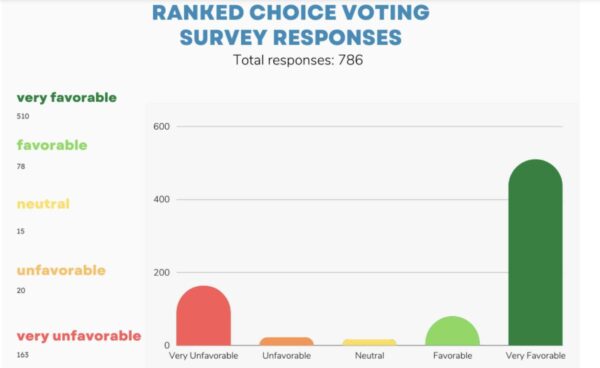
Per the survey, support fluctuated some based on zip code. Support was weakest in the 22207 zip code — residential northern Arlington, which trends a bit more conservative than the rest of deep blue Arlington — where 63% of 152 residents support it. That compared with 75% of 177 residents in the 22201 zip code, which includes part of the Rosslyn-Ballston Metro corridor.
Other zip codes with smaller response rates had higher favorability rates.
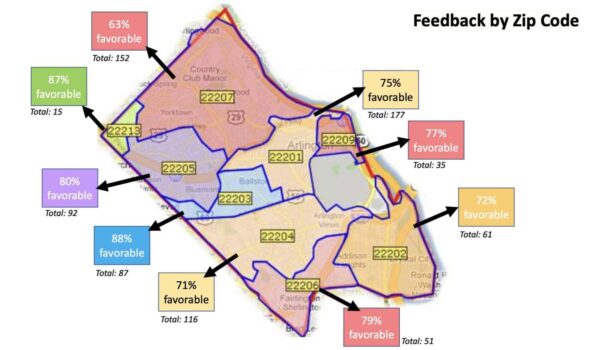
The potential change comes on the heels of other voting reforms enacted by the state, including expanded access to absentee ballots, new automatic and same-day voter registration and new legislative maps.
(Updated at 9:30 p.m.) What many believed would be the most competitive Arlington County Board race in four years has turned out to be another convincing Democratic victory.
The three-way race between incumbent Democrat Matt de Ferranti and independents Audrey Clement and Adam Theo is, at least to some degree, a referendum on Missing Middle housing.
Clement strongly opposes the proposal to allow smaller-scale multifamily housing in neighborhoods currently zoned only for single-family homes, while Theo supports it. De Ferranti, meanwhile, staked out a middle ground, expressing opposition to the higher 8-unit end of the potential range of allowed housing types.
With 55 out of 57 precincts reporting, de Ferranti has 60% of the vote to 28% for Clement and 10% for Theo.
Both Clement and Theo ran for County Board last year, before Missing Middle came to the fore as a hot-button local issue. In the 2021 race, Democrat Takis Karantonis carried about 60% of the vote to 18% for Clement, 6% for Theo and 14% for Mike Cantwell, another independent candidate..
The Missing Middle proposal has attracted the ire of many homeowners, while a coalition of groups — from affordable housing boosters to the local chapter of the NAACP — support it.
An early look at precinct-by-precinct results shows support for Clement in Arlington’s northern, single-family home neighborhoods. The Madison district in far northern Arlington, for instance, has voted 58% for Clement to 36% for de Ferranti and 4% for Theo. She also claimed the Thrifton (Woodmont), Rock Spring, and Yorktown districts — all also in far northern Arlington.
That compares to the more renter-heavy Met Park district, in the Pentagon City neighborhood, which voted 64% for de Ferranti and 20% for Clement and 15% for Theo. A more “in between” district — Fairlington, with its mix of townhouses and smaller condo buildings — voted 66% for de Ferranti, 23% for Clement and 9% for Theo.
Also on the ballot today were School Board and congressional races, which were even more lopsided for the Democratic candidates.
For the open Arlington School Board seat vacated by Barbara Kanninen, Arlington County Democratic Committee-endorsed candidate Bethany Sutton has 68% of the vote to 30% for independent James ‘Vell’ Rives IV.
Meanwhile, incumbent Rep. Don Beyer has 77% of the vote in the Virginia 8th District congressional race, to 21% for Republican Karina Lipsman and 1.5% for independent Teddy Fikre.
Arlington Democrats claimed victory on Twitter just after 9 p.m.
Results are in! Congrats to @DonBeyerVA, @Matt4Arlington on their re-elections to Congress and Arlington County Board and to @BethanyZSutton on her election to the Arlington School Board!
Thank you to the staff & volunteers for their hard work #KeepingArlingtonBlue pic.twitter.com/fQbOjJ6O18
— Arlington Democrats (@arlingtondems) November 9, 2022
De Ferranti tells ARLnow he was impressed by the 85,000 people who voted this election, in which there was no senatorial, gubernatorial or presidential race.
“In Virginia, that doesn’t happen very often,” he said. “There are other elections where there is an even lower turnout. This is a pretty rare election, and to have 85,000 vote in this election is a pretty solid turnout.”
He said addressing climate change, investing in schools and tackling affordable housing and housing affordability — “related but distinct” issues — will be key priorities this term.
“I’m grateful to Arlington residents for the chance to serve them,” he said. “I love doing this job and I’m humbled, grateful, and looking forward to serving over the next four years. I’m going to try and live up to Arlingtonians: that means being smart, thoughtful and compassionate, caring about our community and being forward-looking.”
Clement told ARLnow she was dismayed with the results, though she won four out of 54 districts — including Madison, with her 22-point margin — and came within just over 1% of the vote in another.
“I didn’t perform as well as I thought I would,” she said. “I thought I would push 40% — the sentiment I got on the street indicated a better showing.”
Election Day is here, and thousands of residents are hitting the polls — manned by 426 volunteers — to cast their ballots in the 2022 mid-term election.
By 9 a.m., about 10% of Arlington voted in-person, according to the county elections office, in addition to the 13% of people who voted early and in-person and 7% who voted by mail.
“The polls have been steady so far this morning,” said Tania Griffin, spokeswoman for the Arlington Office of Voter Registration and Elections.
Turnout in a midterm is typically about half the turnout of a presidential election, Arlington Director of Elections Gretchen Reinemeyer previously told ARLnow.
Just over 20,000 people voted early in this year’s general election, Griffin said. Combined with the more than 11,000 absentee ballots sent in, Virginia Public Access Project says Arlington’s early voting rate surpasses those for Northern Virginia and the state. (Nearly 5,000 have not returned the mail ballots they requested.)
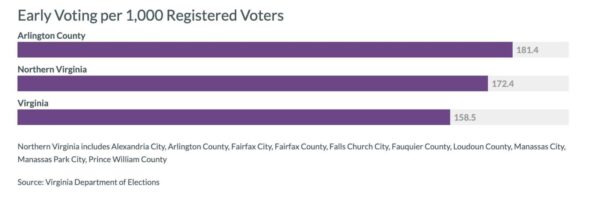
In 2018, the last midterm election, 21,147 ballots were cast early, per VPAP.
While early voting got off to a muted start to in September, and was “slightly slower” than last year’s election, local and statewide Democrats celebrated early voting numbers yesterday during a rally at the home of Matt de Ferranti, the Democrat Arlington County Board incumbent running for re-election.
“The trends are positive, particularly in the three parts of the state that have really competitive congressional districts. We see high numbers, and we really see good Democratic advantage in the early vote,” said U.S. Sen. Tim Kaine (D-Va.), who came out for the rally. “We really like what we’re seeing.”
In the local U.S. House race, Arlington voters can choose among Democrat incumbent Rep. Don Beyer and his two challengers for the 8th District, Republican Karina Lipsman and independent Teddy Fikre.
Kaine said one top driver for races this year is the economy, which he characterized as a mixed bag.
“You have inflation but you have historic job growth. Inflation might make you worry if there’s a downturn coming, but then you see how strong job growth is — during Biden’s term, 10 million-plus jobs, manufacturing coming back, big job announcements with Amazon,” he said. “I think the evidence will be mixed.”
Among the countywide races, voters can choose between two School Board candidates — independent, Sun Gazette-endorsed James “Vell” Rives IV and Arlington County Democratic Committee-endorsed Bethany Sutton.
In Arlington, the most watched race this year is likely that for County Board, which has become a showdown on the topic of Missing Middle housing — the proposal to open up single-family zoning to smaller-scale multifamily housing.
De Ferranti said that could have driven the relatively higher early voting showing.
“The early vote we’re seeing is so stepped up that we’ll have to see what the total turnout is,” de Ferranti said. “This is greater turnout than 2018 so far, and I think some of that is the discussion we’re having on housing.”
His challengers for County Board — frequent independent candidate Audrey Clement and second-time candidate Adam Theo — say Missing Middle is a litmus test this election.
“After squeezing in last minute doorknocking yesterday, and all the responses I’m receiving this morning at precincts, I’m feeling very optimistic for the campaign and the success of the Missing Middle housing proposal,” Theo told ARLnow.

Your poop could give Arlington County natural gas to power buildings or buses.
The county is developing plans to upgrade its Water Pollution Control Plant, where local sewage goes. One change involves installing technology that can harness the methane emitted when human solid waste is processed, turning it into renewable natural gas, a process some municipalities have already implemented.
The energy could be used to power the wastewater plant, homes and commercial buildings or become an alternate fuel for ART buses. The “sludge” created through this process can also be used as a fertilizer for gardens, forests, farms and lawns. (If you’ve ever used Milorganite brand fertilizer, you’ve used dried sewage sludge from Milwaukee.)
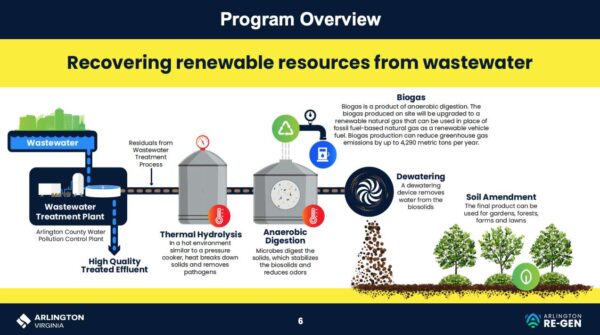
Improvements to the wastewater treatment facility, to the tune of $156 million, are part of a $177 million bond request for utilities upgrades, which also includes improvements the regional Washington Aqueduct system ($15 million) and new gravity transmission mains ($3 million).
Funding for this work would come from a half-billion dollar bond referenda that voters will be considering on Election Day tomorrow (Tuesday). Over $510 million will go toward this work as well as a host of initiatives, upgrades and maintenance projects that Arlington County adopted as part of its 2023-32 Capital Improvement Plan.
Some big-ticket items have already grabbed headlines, like the $136 million requested to build a new Arlington Career Center campus and $2 million to design a proposed Arlington Boathouse on the Potomac River near Rosslyn. But there are dozens of other upgrades proposed for facilities that Arlingtonians of all ages use on a regular, and sometimes daily, basis.
Renovations to existing county buildings and the construction of new ones surpass $53 million.
Highlights include:
- $13.1 million for various renovations to Arlington’s police headquarters and, for the county’s courts building, technology upgrades, new finishes, a redesigned entrance and a relocated Juvenile and Domestic Relations Courts division.
- $12 million to fund the construction and renovation of some floors of 2020 14th Street N. to make room for ACFD Fire Marshal and Battalion Chiefs offices and other public safety staff and functions. It will also see the replacement of the building’s 60-year-old HVAC system.
- $7.5 million to acquire land next to the Serrano Apartments to build a fire station there and improve response times on the west end of Columbia Pike, given the pace of development along the Pike.
Overall, Arlington Public Schools is asking for $165 million. Of that, some $12.24 million would pay for safer school entrances, a measure many school systems nationwide are implementing in the wake of high-profile shootings, and new kitchens to allow more meals to be made in-house.
“Upgraded kitchens will allow students to eat high-quality meals that include more fresh fruits and vegetables that are prepared on-site,” according to APS. “The entrance and security vestibule updates will comply with current safety and security standards while ensuring all visitors check in at the main office.”

Another $16.8 million would pay for a new roof for Escuela Key, the Spanish-language immersion elementary school, HVAC replacement at Hoffman-Boston Elementary School and lighting upgrades across schools.
The Arlington Dept. of Parks and Recreation is asking for nearly $22.5 million for a dozen projects.
That includes some funding $1.5 million to replace and renovate some stretches of the county’s nearly 40 miles of off-street, multi-purpose trails, 56 pedestrian bridges and 11 low-water fords.
Preschool- and school-aged kids could have new playgrounds at Bailey’s Branch, Monroe and Woodmont parks sometime in 2024 ($2.8 million). Douglas Park will see $2 million in improvements, including a new picnic shelter, pedestrian bridge, stormwater management, invasive species removal and reforestation.
Athletes who play at Kenmore Middle School could have new turf fields ($300,000).
There’s $1.1 million in funding to design new facilities at Short Bridge Park, near the border of the City of Alexandria, as well as $1.8 million to redesign Gateway Park in Rosslyn, which the budget says is “difficult and dangerous to access due to the surrounding high-speed roadways” and is “under-utilized.”
People who live in the Ballston and Virginia Square areas would be able to get in on the ground floor of master planning processes ($1.5 million) next year to upgrade Maury, Herselle Milliken and Gum Ball parks starting as early as 2025.
The second, $4.4 million phase of work on Jennie Dean Park will move forward, including demolishing the existing WETA building, two parking lots and a portion of 27th Street S., installing a lighted basketball court and converting the existing court for tennis use.
The growing pickleball population, sometimes at odds with neighbors, and the dirt trail-less mountain bike enthusiasts could get new facilities through $2 million to convert tennis courts at Walter Reed Community Center for pickleball use, draw pickleball lines on some multi-use courts and fund “design improvements to natural surface trails and mountain biking improvements.”

